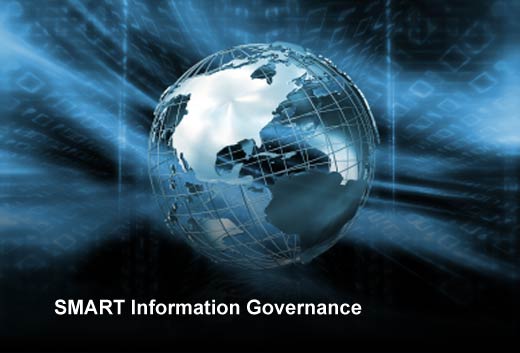Recently, ARMA International held its 59th Annual Conference & Expo in San Diego, California, bringing together professionals in the records and information management industry with organizations interested in bolstering their information governance policies. In today’s business environment, it’s crucial that corporate documents are governed to ensure that organizations remain competitive and compliant. As the mountain of information grows, so does the burden to manage it and avoid the risks associated with mismanagement.
One of the major trends coming out of ARMA 2014 was the notion of transitioning from records management to information governance. The digital age has presented a host of new challenges with regards to managing electronic information, challenges that are not being addressed by the practices long used for physical records. The transition to information governance is necessary given that records management has its roots and practices based in managing physical files and papers, while information governance is centered on looking after and making decisions about an organization’s information assets, throughout its entire lifecycle.
This slideshow features information governance trends and best practices from the industry’s top players at this year’s ARMA conference, as identified by Bassam Zarkout, CTO, RSD.
ARMA Live! 2014 Highlights
Click through for governance trends and best practices coming out of ARMA Live! 2014, as identified by Bassam Zarkout, CTO, RSD.
Pharma and Health Care
Increased risks for highly regulated industries – like health care and pharmaceutical – have driven the need for stricter requirements and guidelines. Over the past several years, the FDA and NHS have put out guidelines and regulations to help health care and pharmaceutical companies assess their governance processes.
Attendees at the conference learned how information governance programs can provide safe and reliable ways for organizations to govern a variety of structured and unstructured data created by ICD-10, electronic health records (EHR), payment information, clinical trials and more.
One example was the NHS’ issuance of its Information Governance Toolkit, a set of requirements that companies can evaluate themselves against, which includes assessment details such as identifying management structures and responsibilities and how to handle and govern confidential corporate and patient data in a secure environment.
Another example included the FDA’s update to its Drug Supply Chain Security Act, which identifies and traces certain prescription drugs in the supply chain, as well as its update to the Unique Device Identification rule, which requires systems to “adequately identify medical devices through their distribution and use.”
SMART Information Governance
RSD’s theme at ARMA 2014 was a focus on the need to transition from records management to SMART information governance. SMART information governance improves value placed on information, saves money and mitigates risk. The keys to SMART information governance are: simple, measureable, achievable, repeatable and transformational.
At the event, RSD launched a free version of RSD IGaaS™ Policy Manager SE to help companies create new policies and better govern their confidential data and intellectual property. The free version of Policy Manager lets customers access its key features at no charge in a cloud-hosted environment by leveraging RSD’s information-governance-as-a-service (IGaaS™) architecture.
Predictive Coding
Predictive coding, which helps to classify content in an automated method, continues to be a key ingredient in proper information governance programs. It is considered by some to be ideal for e-Discovery technologies, allowing for quick and easy classification and identification of legal documents. However, while many do believe this is a growing trend, others find that it has not gained much traction due to its limited capabilities.
Yes, it can help with classification of the content, but there are many moving pieces to the information governance puzzle. Ensuring content is placed under proper governance throughout the entire lifecycle of the content is crucial. This is especially important given that content may span decades and reside in different repositories — for technical, business and legal reasons, content will never reside in one system. Companies that are looking into predictive coding technologies should also consider a more extensive and robust information governance program to properly govern their sensitive digital assets.
Automation
Organizations can’t afford the risk of unreliable microfilm systems in today’s complex regulatory environment with exploding data volumes and ever-increasing demands for information access. But a surprising number of organizations have been slow to deploy scanning and document automation – despite the obvious business and operational benefits.
Attendees heard from key panelists on why these organizations are making a grave mistake, strategies for making automation plans a reality and how key trends in records management are making document automation more imperative than ever.
Collaboration
At ARMA 2014, Recall stressed the need for organizations to focus on collaboration. While traditionally, the three departments (records managers, IT departments and legal) tasked with overseeing information management within a company remained separate, today’s digital age calls for collaboration. As companies begin implementing IG programs, these entities must work together more proactively in order to build and maintain an effective IG strategy across an organization.
Also at the event, Recall launched Recall Portal, its web-based tool that offers customers enhanced control and instant insight into all of their Recall-managed physical and digital information. The product, which will be available beginning December 1, 2014, enables customers to create and review real-time reports across multiple geographies and Recall service lines from any mobile device or computer.








